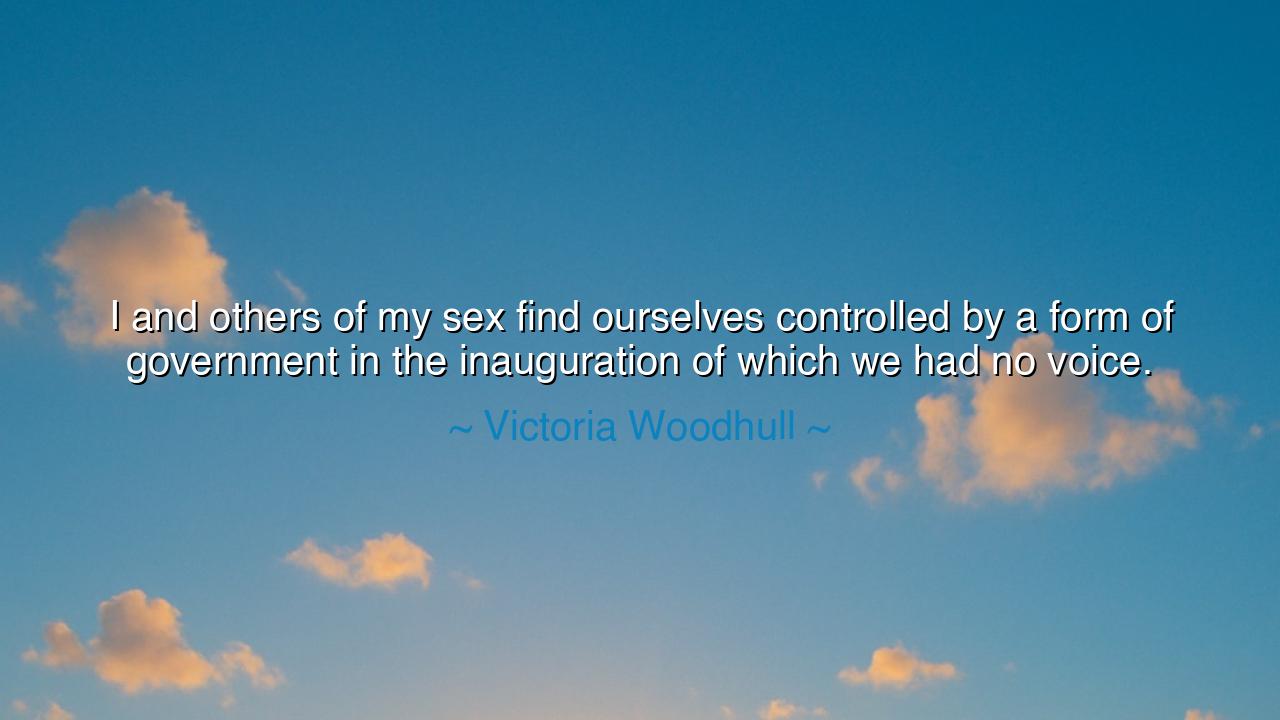
I and others of my sex find ourselves controlled by a form of
I and others of my sex find ourselves controlled by a form of government in the inauguration of which we had no voice.






The words of Victoria Woodhull rise from the pages of history like a clarion cry for justice: “I and others of my sex find ourselves controlled by a form of government in the inauguration of which we had no voice.” In this single sentence, she captured the anguish, the rebellion, and the awakening of an entire generation of women. Her voice, fierce and unyielding, speaks not merely of exclusion from politics, but of the deeper wound of being governed without consent—a wound that cut to the soul of democracy itself. For how can a nation call itself free when half its people have no say in the laws that bind them? Woodhull’s declaration is not just protest—it is prophecy. It foretells the birth of equality through struggle, courage, and faith.
The origin of this quote lies in the fiery landscape of the nineteenth century, a time when the ideals of liberty that built the American Republic still stopped short of its daughters. Born in 1838, Victoria Woodhull was no ordinary reformer. She was a trailblazer—the first woman to run for President of the United States, a spiritualist, an orator, and a fearless advocate for women’s suffrage. Her words were forged in an age when women were denied the right to vote, to own property independently, or to speak freely in public life. In uttering this truth, she gave voice to millions who had been silenced by tradition. “Controlled by a government we did not help create”—this was not only her lament but the foundation of her cause: that representation without inclusion is tyranny by another name.
In the ancient style, let us uncover the deeper wisdom behind her words. Government, in its truest form, is a sacred contract between rulers and the ruled—a covenant of consent. To exclude any portion of humanity from that covenant is to break its moral spine. Woodhull understood this with the clarity of one who had tasted both oppression and freedom. She saw that the greatness of democracy lies not in the power it gives, but in the voice it shares. A government that rules without hearing all its people, she warned, becomes not a guardian of justice, but a custodian of inequality. The legitimacy of any law, she declared, must rest upon the consent of the governed, and if women’s voices were excluded, that consent was but a hollow echo.
Consider the world in which she spoke. The Suffrage Movement was still a whisper on the wind, met with ridicule and violence. Yet Woodhull dared to stand before Congress in 1871 and demand the recognition of women’s right to vote under the Fourteenth and Fifteenth Amendments. It was an act of defiance and genius, for she argued not as a beggar of favors but as a citizen invoking justice. Her logic was unassailable: if women were bound by the laws, taxed by the state, and punished by its courts, then they must also share in the power that creates those laws. “Governed, yet voiceless,” she said—an indictment that struck at the very conscience of the republic.
History vindicated her courage. Decades later, the Nineteenth Amendment to the Constitution would finally recognize the right of women to vote. The victory came not through violence, but through perseverance—through the tireless voices of women who refused to accept a freedom that excluded them. But though the chains of silence were broken, the spirit of Woodhull’s warning still echoes. For every age brings new forms of voicelessness, new groups left unheard. Her words remind us that democracy is not a finished monument, but a living fire that must be kept alive by vigilance, empathy, and participation.
There is also a personal truth hidden in her declaration—a truth about voice itself. Every human being, regardless of gender, status, or race, possesses an inner flame of reason and conscience. To deny anyone the right to express that flame in the affairs of society is to darken the light of civilization. Woodhull’s life was proof of this: she faced mockery, scandal, and exile, yet she never surrendered her voice. Her defiance teaches us that silence, when imposed by power, is the greatest form of bondage, and that speaking truth—no matter how the world reacts—is the first act of liberation.
So, my children of the future, take this lesson from Victoria Woodhull’s immortal words: freedom is meaningless without participation. Do not rest upon the victories of those who came before you. Every generation must renew the covenant of democracy by ensuring that all have a voice in shaping it. Listen to those unheard, uplift those silenced, and remember always that the strength of a nation lies not in the power of its rulers, but in the dignity of its people.
For as Woodhull declared, to be controlled by a government without one’s consent is to live in chains disguised as order. But to rise, to speak, and to demand a place in the chorus of humanity—that is to make democracy real. Let every citizen, man or woman, rich or poor, remember this truth: the republic belongs to those who claim it. And it will remain free only so long as every voice, however small, dares to be heard.






AAdministratorAdministrator
Welcome, honored guests. Please leave a comment, we will respond soon